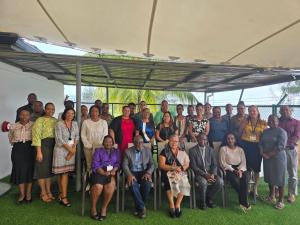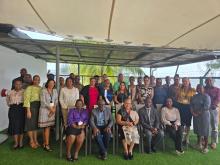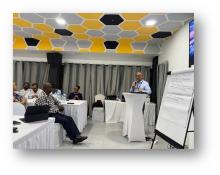Seychelles paving the way for sustained immunization efforts to 2030: WHO's technical assistance for Seychelles' National Immunization Strategy
Victoria—From February 3 to February 7, 2025, the Seychelles Ministry of Health, in collaboration with the World Health Organization (WHO), conducted a vital workshop to develop the country's National Immunization Strategy (NIS). This initiative followed extensive efforts that were made in 2024 to conduct a situation analysis on the programmes performance, successes, challenges, and opportunities for improvement. The development of an NIS is aimed at enhancing public health through effective immunization programs, ensuring that the Seychelles population is protected against preventable diseases.
The workshop commenced on February 3, focusing on past accomplishments and evaluating the current status of immunization efforts in Seychelles. Key presentations included an overview of Seychelles health sector strategic goals with key focus on primary health care and the Expanded Program on Immunization (EPI), led by Dr. Danny Louange, Chief Executive Officer of the Health Care Agency, and WHO Representative Dr. Rex Mpazanje. Participants engaged in discussions about the implementation of the country’s comprehensive multi-year plan (cMYP) from 2017 to 2023, as well as broader immunization programs across the African region and Globally in line with the Immunization Agenda 2030 targets.
On the second day, the focus of the workshop shifted to defining strategic priorities for the Expanded Program on Immunization (EPI). Participants were divided into groups to identify two strategic priorities along with specific objectives for each. This structure facilitated in-depth discussions on essential areas such as program management, vaccine supply, logistics, and service delivery. The collaborative effort culminated in a consensus-building session that underscored the significance of unified action in achieving immunization goals. Notably, this approach included engaging non-traditional immunization stakeholders and other public health actors, highlighting the interconnectedness of various health sectors in enhancing overall public health outcomes.
The workshop's third day was devoted to articulating activities and costing for the NIS from 2026 to 2030. Participants reviewed the strategic priorities established on the previous day and engaged in group work to devise actionable plans covering program management, vaccine logistics, and data management, ensuring a comprehensive approach to immunization strategy development.
As the workshop progressed into its fourth day, participants focused on developing and finalizing the draft narratives of the NIS, collating feedback and insights from earlier discussions to create a cohesive document outlining Seychelles’ immunization goals and strategies for the next five years.
The final day featured presentations of the draft NIS, with remarks from the Principal Secretary of Health Dr. Bernard Valentin and other health officials appreciating the collaborative effort between the Ministry of Health and WHO in developing a robust immunization strategy. The engagement and commitment shown by all participants reflected the importance of a strong immunization framework for the health and well-being of the Seychelles population.
Emerging key priorities from the workshop included the review and finalization of a comprehensive immunization policy, enhancing program management and logistics, implementing a robust data management system, and addressing vaccine hesitancy through targeted communication campaigns. Specific recommended activities outlined include the recruitment of data management officer and health promotion officers, the integration of vaccination services with other health initiatives, and the development of a costed risk communication plan to bolster public trust in vaccines.
This workshop represents a significant milestone in Seychelles’ public health journey, positioning the country to enhance its immunization coverage and health outcomes with the continued support of the WHO. Importantly, the Seychelles government is committed to protecting all citizens from vaccine-preventable diseases. It is worth noting that Seychelles is one of the few countries in the region that has self-financed its vaccine procurement and program activities with minimal support from donors and partners, demonstrating the government's dedication to public health. Together, we are forging a path toward a healthier future for the nation.





